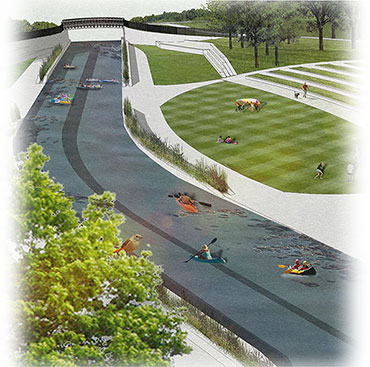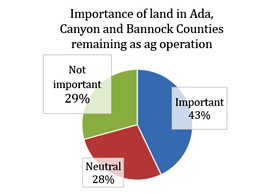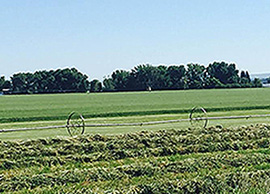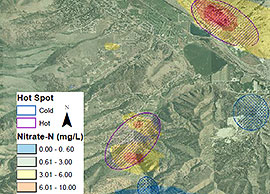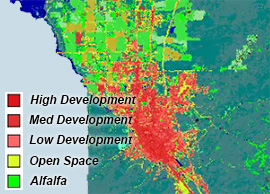Welcome to MILES!
 MILES is an acronym for "Managing Idaho's Landscape for Ecosystem Services", which is the research theme of this program. The National Science Foundation awarded the Idaho EPSCoR program $20M for 2013-2018 to improve Research Infrastructure related to social ecological systems science. These funds are shared equally by Idaho State University, Boise State University, and University of Idaho to build a sustainable environment characterized by world-class scientists, facilities, and culture that fosters transdisciplinary Research and Workforce Development.
MILES is an acronym for "Managing Idaho's Landscape for Ecosystem Services", which is the research theme of this program. The National Science Foundation awarded the Idaho EPSCoR program $20M for 2013-2018 to improve Research Infrastructure related to social ecological systems science. These funds are shared equally by Idaho State University, Boise State University, and University of Idaho to build a sustainable environment characterized by world-class scientists, facilities, and culture that fosters transdisciplinary Research and Workforce Development.
This web page focuses on MILES projects involving researchers at Idaho State University. A complete presentation of MILES activities across Idaho can be found HERE .
MILES research and education is completed by a diverse team of scientists, students, and support staff. At Idaho State University, the team includes ~15 professors who are ecologists, geologists, historians, sociologists, political scientists, and computer scientists. Three post-doctoral research associates and 5-10
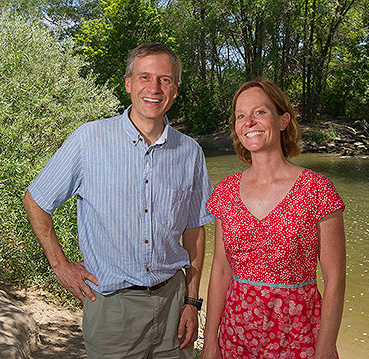
RESEARCH

WORKFORCE
DEVELOPMENT
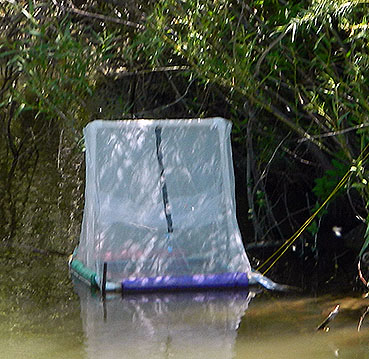
INFRASTRUCTURE
DEVELOPMENT
RESEARCH
MILES scientists study the relationship between humans and their natural environment, in particular the use of ecosystem services provided by nature. More specifically, we focus on the margins of mid-sized cities to characterize how the use of ecosystem services changes as these communities grow in space and time. Our goal is to identify the drivers of change, create models to predict future use of ecosystem services, and then inform decision-makers, such as city and county governments or federal land agencies, of their future options.
We adopt a unique approach to studying Ecosystem Services. First, we form collaborative research teams of biophysical and social scientists to equally characterize the natural ecosystem and human-environmental interactions. Second, we initiate our research by asking stakeholders what ecosystem service changes, real or potential, are most important to them. Their answers guide our research plan and provide an audience for our results, yielding an immediate impact for our research findings.
MILES scientists at Idaho State University have projects all across Idaho, but much of our research concerns water-related ecosystem services near Pocatello along the lower Portneuf River. We analyze services such as water supply (irrigation, drinking water), water quality, flood control, and water-based aesthetic and recreational services (fishing, boating, hiking, biking) with particular interest in the different ways that rural and urban citizens prefer to manage each type of service.
WORKFORCE DEVELOPMENT
MILES is training a diverse workforce for Idaho's industry, businesses, and government agencies. We select well-qualified students, provide interdisciplinary training and mentorship, and teach them to be valuable team members. Nearly all education is outside the classroom where students learn to be responsible, independent, problem-solvers. Recognizing the value of gender- and ethnic-diversity to our future, MILES students include a large number of women and under-represented minorities.
Graduate students receive full funding and complete MS theses or PhD dissertations on a MILES-related topic. Supervised by an interdisciplinary team of professors, these students will enter the workforce with a unique skill set and understanding of coupled human and natural systems. Idaho State University will train ~20 graduate students through the MILES program, and those who have already graduated are now employed or pursuing futher education in MILES-related science.
Undergraduate students participate in the MILES Undergraduate Research Internship (MURI) program. Each student spends ~300 hours during the school year or summer as a team member on a MILES research project, supervised by a faculty member or graduate student. The impact is substantial - after the internship a majority of undergraduates say they now want to earn a PhD degree. Idaho State University will train 100 undergraduate students through the MURI program. Further information on the MURI program can be found HERE .
K12 teachers can participate in the week-long Adventure Learning program. Hosted each summer at each of the three universities, Adventure Learning provides knowledge and instructional materials so that teachers can introduce modern concepts of Ecosystem Services to multiple cohorts of pre-college students. Idaho State University will train ~50 teachers directly and another ~100 teachers through its digi-learning platform.
INFRASTRUCTURE IMPROVEMENT
To sustain our social ecological systems Research and Workforce Development beyond 2018, MILES is investing its resources to build a sustainable environment characterized by world-class scientists, facilities, and culture. We've hired new interdisciplinary faculty, created new data management protocols, adopted innovative technology, and developed new administrative structures at each university. The impact is substantial - we have significant scientific expertise, outstanding research tools, and a hard-earned reputation for excellence amongst our stakeholders and partners.
At Idaho State University, we've hired three new Research Faculty with substantial cross-training in biophysical and social sciences. These scientists strengthen the linkages between our traditionally trained scientists and provide unusual expertise in ecosystem service analyses.
We've also developed strong working relationships with external groups to study land use and ecosystem services in the surrounding region:
- City of Pocatello
- Portneuf River Vision Study
- US Army Corps of Engineers
- Natural Resources Conservation Service,
- Bureau of Land Management
- US Forest Service.
Finally, we're adding our MILES resources to the Idaho State Univeristy, "Center for Ecological Research and Education (CERE)", a state board-approved Research Center that will provide a sustainable home for MILES scientists and students beyond the current NSF award.

contact us
-
Dr. David Rodgers
MILES Site Leader
Idaho State University
rodgdavi@isu.edu
208-282-3460 -
Dr. Shawn Benner
MILES Site Leader
STOP 8027
sbenner@boisestate.edu
208-426-1631 -
Dr. John Anderson
MILES Site Leader
University of Idaho
jwa@uidaho.edu
208-596-3420 -
Rick Schumaker
Assistant Project Director, MILES
rschumak@uidaho.edu
208-885-5742
 graduate students participate each year, as well as 20 undergraduate student interns and 5 support staff. A full list of Idaho State University participants, along with equivalent teams from Boise State University and University of Idaho, can be found
graduate students participate each year, as well as 20 undergraduate student interns and 5 support staff. A full list of Idaho State University participants, along with equivalent teams from Boise State University and University of Idaho, can be found 